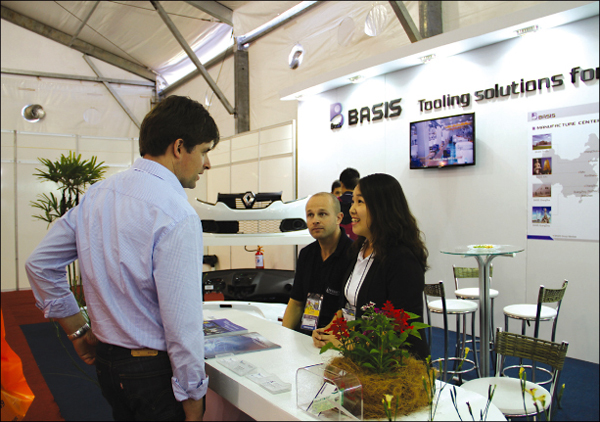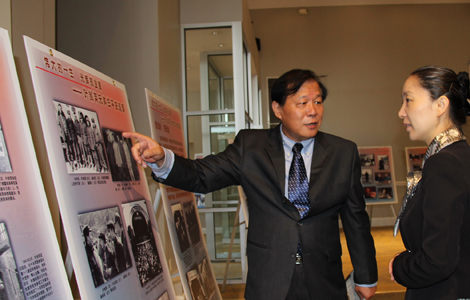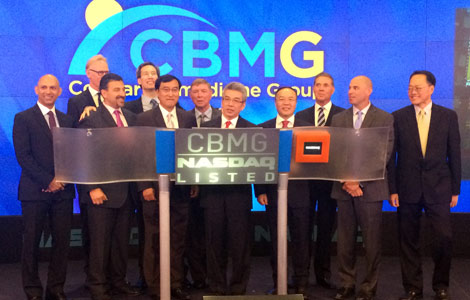Auto-moulding firms eye Brazil
Updated: 2014-08-25 06:48
By ZHANG FAN in Joinville, Brazil(China Daily Latin America)
|
||||||||
 |
|
A Brazilian customer asks about the products produced by Shenzhen SilverBasis Technology Co on Aug 19 in EuroMold Brazil exhibition held in Joinville, a southern city of Brazil. Zhang Fan / China Daily |
Brazil's rapidly developing automotive industry is viewed as a great opportunity for supporting industries, especially China's tooling industry, as more and more Chinese moulding companies seek potential customers.
Almost 20 Chinese moulding companies participated in the EuroMold Brazil exhibition from Aug 18 to 22 in Joinville, an industry center in southern Brazil.
"This is the first year for us to participate in the trade show. We have entered the Brazilian market for three years through the cooperation of a local partner and the trade volume has kept increasing," said Tai Lihua, account manager of Shenzhen Silver Basis Technology Co.
Basis has been providing tooling equipment for the Brazil-based branch company of international automotive giants including Volkwagen, Ford and Renault.
"The automotive market here developed rapidly, which means there will be an increasing need for tooling products. Basis holds high expectations for the future," Tai said.
Six tooling companies from Huangshi in Hubei province, also attended the exhibition. Huangshi is the leader in China's tooling industry, producing 50 percent of the total products.
"We want to find a new growing point for our industry," said Zhang Shiliang, vice-director of Huangshi's business and commercial committee. "China and Brazil are getting closer, and we are getting more interested in this market."
Brazil is the world's fourth-largest automotive market and seventh-largest producer. According to the Brazilian Association of Tooling Industry, the growth rate of Brazil's automotive industry has expanded 11.4 percent since 2002. There are 146 cars for every 1,000 people in Brazil versus 18 in China.
Late last year, BMW Group launched its first South American automotive assembly plant in Araquari in the southern part of Brazil. The plant is scheduled to start manufacturing in the fall.
Mercedes Benz, the world's third-biggest producer of luxury cars, also announced last year that it will build a factory in Brazil for its mid-sized C-Class and GLA models. Audi also will begin vehicle production in Brazil with an investment of $225 million through 2016.
And Chinese automakers also have enlarged their presence in the Brazilian market, with brands such as Chery, Jac Motors and Lifan among the top-10 best-selling vehicles in Brazil, ranking 4, 8 and 10, respectively.
The Brazilian government has sought to spur the automotive industry, and in 2012 created "Inovar-Auto'' program to encourage innovation in vehicle technology.
"The automotive industry remains the largest market for moulding industries. Brazil is part of a car industry market that is starting to shift to South America from North America," said Christian Dihlmann, president of the Brazilian Tooling Industry Association. "Chinese moulding companies are among the strongest competitors for Brazilian moulding industries because of their lower cost and increasing quality."
Despite a potentially large market, the Chinese moulding industry still finds it hard to gain significant market share in Brazil.
"Our current market share in Brazil is still limited. Some companies have tried to explore this market for years and made progress, but it is still far from the their goal," said Wu Bingshu, executive vice-president of China Mould Industry Association. "The Chinese moulding industry, especially for the automotive industry, is of higher technology and can provide middle and high-end products for Brazilian automotive companies, but we still need to overcome a series of problems from tax to industry policies."
His comments were echoed by Dihlmann.
"Though Chinese products are of strong competitiveness, some local companies still do not want to use the products from China because of their concern of industry invasion," said Dihlmann. "There are still some misunderstandings between the two sides. The better way to start the cooperation is to build a strategic interchange plan between governments and associations. I am sure we can do a very good plan. but we need to sit and talk about it."
fanzhang@chinadailyusa.com

 Quake rocks California wine country, 120 injured
Quake rocks California wine country, 120 injured
 Bao Bao, blessed with many birthday wishes
Bao Bao, blessed with many birthday wishes
 Heartbreaking partings for 'left-behind children'
Heartbreaking partings for 'left-behind children'
 Yao Ming takes on Ice Bucket Challenge
Yao Ming takes on Ice Bucket Challenge
 Luxury automobile expo held in Beijing
Luxury automobile expo held in Beijing
 YOG: Mixed intl team semifinal of table tennis
YOG: Mixed intl team semifinal of table tennis
 Exhibit explores Marshal Ye's legacy
Exhibit explores Marshal Ye's legacy
 The tiara club
The tiara club
Most Viewed
Editor's Picks

|

|

|

|

|

|
Today's Top News
Calif. governor declares emergency from quake
American held in Syria freed
Washington DC seeks more Chinese tourism
California hospital treats 70 plus after quake
White House aides to attend funeral of black teen
Man, 18, accused of being mastermind in imam's murder
China urges US to stop close-in surveillance
US seeks multi-prong strategy against ISIL forces
US Weekly

|

|







